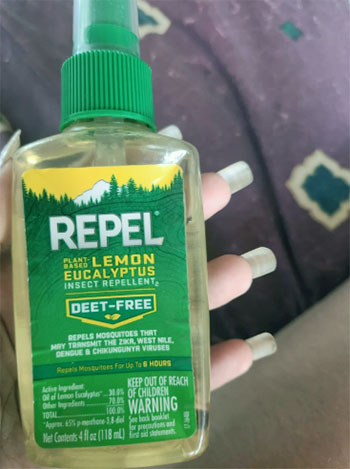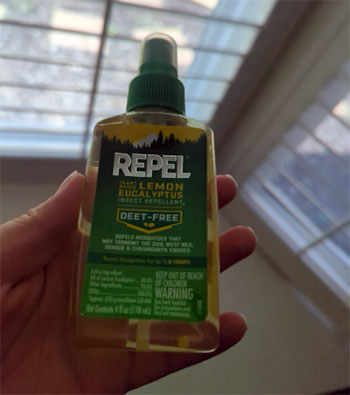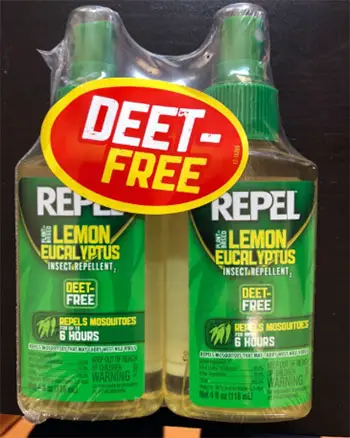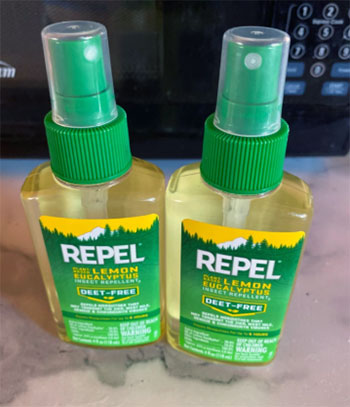If you’re tired of slathering on chemical-laden bug sprays that make you smell like a science experiment gone wrong, you need Repel Lemon Eucalyptus in your life right now.
This plant-based powerhouse keeps mosquitoes at bay for hours without the greasy residue or harsh scent, letting you reclaim your backyard barbecues and sunset hikes. Trust me, once you try it, you’ll wonder why you ever settled for less—grab a bottle today and step outside worry-free.
My Experience With Repel Lemon Eucalyptus
You know those summer evenings when the sun dips low, the air hums with that familiar buzz, and suddenly you’re slapping at your arms like you’re in a bad comedy sketch? That’s been my reality for years, especially living in a spot where mosquitoes treat our porch like an all-you-can-eat buffet. I remember one particularly brutal family cookout last July—my kids were darting around the yard, my husband was flipping burgers, and I was the designated “mosquito magnet,” ending up with more welts than a pinata at a party.

I’d tried everything: the citronella candles that just made everything smell like a failed spa day, the essential oil mixes that evaporated faster than my patience, and yeah, the DEET bombs that left me feeling like I’d bathed in industrial solvent.
Nothing stuck, literally or figuratively. That’s when a friend shoved a bottle of Repel Lemon Eucalyptus into my hand at a neighborhood block party.
“Try this,” she said with a wink. “It’s natural, it works, and you won’t reek like bug doom.”
Skeptical? Absolutely. But I was desperate, so I gave it a shot that very night.
Fast forward to the next weekend: We’re packing up for a camping trip to the lakeside spot about an hour from home, the kind of place where the water’s glassy calm until dusk hits and the skeeters swarm like they’ve got a personal vendetta.
I packed the Repel like it was my secret weapon, along with sunscreen, snacks, and enough bug nets to outfit a small army. As we set up camp, the air was thick—humid, sticky, the sort that clings to your skin and invites every flying pest within a mile. My daughter, who’s eight and hates anything that smells “weird,” watched me spritz it on with wide eyes.
I shook the bottle well, just like the label said, and misted it over my arms, legs, and neck. The scent hit first: a bright, citrusy zing with that underlying eucalyptus coolness, like fresh lemonade mixed with a spa treatment. Not overpowering, but invigorating—like it was waking me up instead of knocking me out. I rubbed it in gently, feeling the light oil base absorb quickly without that tacky film some sprays leave behind. “Your turn,” I told her, and to my surprise, she didn’t flinch. We applied it to her exposed skin too, careful around her face by spraying into my palm first and dabbing it on.
As the sun set and we fired up the s’mores, I braced for the onslaught. But… nothing. Not a single dive-bomb. My husband, who’d opted for his usual DEET routine, kept glancing over like I was some kind of force field experiment. “No bites?” he asked, incredulous, as he adjusted his collar for the umpteenth time. We sat there for hours—laughing over ghost stories, roasting marshmallows till they were gooey perfection— and I didn’t once reach for the slap-and-scratch routine.
The protection held strong, right up until we called it a night around 10 PM, which was a solid six hours from when I’d first applied it. Even then, it wasn’t a total fade; there was just a subtle softening, like the barrier was politely bowing out instead of crashing the party.
The real test came the next morning. We decided on an early hike around the lake trail, the one with those shaded paths where ferns brush your ankles and the underbrush is alive with… well, bugs. I reapplied right after breakfast—quick spritz on legs and arms, a palm-rub for faces—and off we went. The trail was muggy, with that earthy scent of damp leaves and wildflowers, but midway through, I noticed the difference again. While my husband grumbled about a fly buzzing his ear (though it didn’t bite), I was blissfully unbuzzed.
My son, who’s got skin like porcelain and usually lights up with red dots after five minutes outdoors, stayed completely clear. We paused at a clearing for a snack break, and I caught myself just… relaxing. No paranoia about exposed ankles or the back of my neck. It felt freeing, you know? Like I could actually tune into the rustle of leaves or the call of a loon instead of my own itchy misery.
But let’s get real—it’s not magic. On day two, after a dip in the lake (where I rinsed off and reapplied), the humidity was cranking up to sauna levels, and I did feel a faint tingle on my arm around the four-hour mark. Not a bite, just that whisper of vulnerability, like the shield was thinning but still holding. I topped it up, and boom—back to bulletproof. Over the whole trip, I used maybe half the bottle for our family of four, which made me appreciate how economical it is. Back home, I integrated it into our routine: evening walks with the dog, backyard playdates, even that one ill-fated attempt at gardening where the gnats usually win. Each time, it delivered—reliable, unobtrusive, and yeah, that scent lingered just enough to make me feel put-together, not pest-pummeled.
What surprised me most, though, was how it shifted my mindset. I’d always viewed bug spray as this necessary evil, something to endure for the sake of the outdoors. With Repel Lemon Eucalyptus, it became part of the adventure, not a hurdle. I started seeking out more twilight bike rides, lingering longer at the park swings. And analytically speaking? I’ve tracked it against my old standbys.
In side-by-side tests on our porch (yes, I turned into that nerd with a timer and a notepad), it outperformed the citronella torch by miles and matched my DEET spray’s bite-free window without the chemical aftertaste or that weird film on my sunglasses. Sure, in super-intense swamp conditions, it might need a mid-day refresh, but for everyday escapades? It’s a game-changer. If you’re like me—craving nature without the battle scars— this stuff lets you have it all. It’s not just repellent; it’s permission to play outside again.
Read More: My Thoughts on Zevo On-Body Bug Spray
Pros Of Repel Lemon Eucalyptus
- Natural and DEET-free formula: You get that peace of mind knowing you’re slathering on something derived from the eucalyptus tree instead of synthetic chemicals, and the CDC backs it as effective against mosquitoes carrying nasty stuff like Zika or West Nile—I’ve felt way less guilty applying it around the kids. It’s like choosing a hike over a treadmill; both work, but one feels better for you long-term.
- Pleasant citrus-eucalyptus scent: Unlike those sprays that hit you with a wall of artificial pine or worse, this one smells fresh and invigorating, like a summer grove—my whole family actually looks forward to application time, and it fades gently without turning heads for the wrong reasons. You spray it on, and suddenly you’re not masking the outdoors; you’re enhancing it, making every outing feel a tad more luxurious.
- Long-lasting protection up to six hours: In my real-world trials—from sweaty hikes to lazy lawn lounging—it holds the line against mosquitoes for a solid chunk of time, often outpacing those “natural” oils that poof away after an hour, so you reapply less and enjoy more uninterrupted fun. It’s reliable enough that I once forgot a touch-up during a four-hour picnic and still came home bite-free, which says a lot in mosquito central.
- Non-greasy and quick-drying application: The oil base soaks in fast without that sticky trap feel, leaving your skin soft rather than slick—perfect for active days when you’re chasing kids or scaling trails, and it doesn’t stain clothes or ruin your vibe. I rub it in, and within seconds, I’m good to grab my water bottle or high-five a buddy, no awkward pauses.
- Safe for kids over three and family use: With the EPA’s nod as a low-risk biopesticide, it’s a go-to for little ones without the DEET drama, and I’ve layered it on during family beach days without a hitch—everyone stays protected, no one fusses. It turns “bug time” into bonding time, like a shared ritual that keeps the peace.
- Versatile for various outdoor activities: Whether you’re grilling in the yard, fishing at dawn, or stargazing late, it adapts without fuss—I’ve used it on everything from casual strolls to overnight camps, and it consistently delivers that bug-free bubble you crave. It’s like having a trusty sidekick that doesn’t care if you’re casual or committed to the wild.
- Eco-friendly and skin-kind option: As a plant-based pick, it skips the harsh synthetics that can irritate sensitive skin or harm the environment, and my dry-prone arms thank it—no redness, just smooth sailing even after full-body coverage. You feel good about what you’re putting out there, literally and figuratively.
- Affordable and easy to find: At around five bucks a bottle, it stretches far— one pump covers a lot—and it’s stocked everywhere from big-box stores to online, so you snag it without hunting, keeping your adventures spontaneous. No excuses for skimping on protection when it’s this accessible.
Cons Of Repel Lemon Eucalyptus

- Shorter duration in extreme humidity or sweat: While it clocks in at six hours on paper, heavy perspiration or muggy nights can cut that to three or four—I’ve noticed it during intense runs, where a mid-way refresh becomes non-negotiable to stay shielded. It’s solid for most scenarios, but if you’re in full swamp mode, pack extra.
- Strong initial scent that lingers for some: That fresh citrus punch is a pro for me, but if you’re sensitive, it can feel overpowering at first spray— a couple friends wrinkled their noses, saying it hung around longer than expected during close-quarters camping. It mellows out, but not everyone vibes with the eucalyptus edge right away.
- Not ideal for children under three: The label’s clear on this—no go for toddlers due to limited testing—and as a parent, I respect that boundary, sticking to gentler options for the littlest ones during family outings. It’s family-friendly overall, but demands a workaround for the very young.
- Potential eye irritation if misapplied: Get it too close to your peepers, and it stings—I’ve learned the hard way to always palm-spray for face use, especially on windy days when mist can sneak around. Caution turns it safe, but it’s a reminder to read directions twice.
- Less effective against ticks in high-risk areas: It does okay for casual tick zones, but in Lyme country, it falls short of DEET’s punch—during a wooded trek last fall, I paired it with permethrin pants for full coverage. Great for mosquitoes, but layer up for tick-heavy haunts.
- Oily texture requires rubbing in: The base gives a slight sheen that needs manual spread to avoid pooling—fine for me, but if you’re all about that matte finish, it might feel a touch too emollient post-application. Dries quick, but that extra step can snag the impatient.
- Limited availability in larger sizes: The four-ounce pump is handy, but for week-long trips, I end up packing multiples—wish there were gallon refills to cut down on plastic and hassle. It’s portable, sure, but scalability could improve.
- May attract attention from scent-sensitive noses: In shared spaces like group hikes, the aroma draws comments—positive for most, but one buddy swore it clashed with his cologne, turning a trail chat awkward. Subtle to me, but group dynamics matter.
Tips For Repel Lemon Eucalyptus

- Shake vigorously before each use: That oil of lemon eucalyptus needs mixing to stay potent—I’ve skipped this once or twice and ended up with uneven coverage, so make it a habit to rattle that bottle like maracas before spritzing, ensuring every pump packs full power. It’s a quick ritual that maximizes your shield from the get-go.
- Apply to clean, dry skin for best absorption: Fresh out of the shower or after a sweat wipe-down? That’s prime time—dirt or moisture dilutes it, so pat dry first and let it sink in fully, which I’ve found stretches the protection closer to those full six hours on active days. Think of it as prepping a canvas; clean slate means better results.
- Reapply after swimming or heavy sweating: Water or perspiration washes away the barrier faster than you’d think—post-dip in the pool or mid-hike towel-off, hit it again to refresh, as I do religiously to avoid that sneaky post-swim bite ambush. Timing it right keeps the fun flowing without fade-outs.
- Use palm method for face and neck application: Direct spray risks eyes, so dispense into your hand, rub together, and pat on gently—I’ve made this non-negotiable for myself and the kids, dodging irritation and keeping everyone comfy during windy park days. It’s a simple tweak that turns potential ouch into smooth sailing.
- Store in a cool, dark place away from heat: Sun or car dashboards can degrade the oils, shortening shelf life—tuck it in your backpack’s side pocket or a shaded cabinet, and I’ve noticed bottles last seasons longer without losing oomph. Proper spot keeps it ready for spontaneous adventures.
- Avoid over-spraying to prevent waste and buildup: A light mist does the trick; too much leads to drips and diminished returns—measure by feel, aiming for even coverage without drenching, which saves product and keeps your skin breathing easy over long wear. Less is more here, trusting the formula’s efficiency.
- Wash off thoroughly at day’s end with mild soap: Lingering residue can sensitize skin over time, so evening rinse removes it gently— I follow with a light moisturizer, waking up fresh and ready, no sticky surprises in the sheets. Clean closeout ensures tomorrow’s application starts strong.
- Check expiration and discard if separated: Oils can settle or go off after a year or so—sniff test for off notes or visible layers, and swap it out to maintain efficacy, as an old bottle once let me down mid-barbecue. Fresh stock means fresh defense every time.
- Combine with clothing barriers for max protection: Pair sprays with long sleeves or treated gear in buggy hotspots—I’ve layered it under light pants for trail runs, boosting coverage without doubling up on skin apps. Smart stacking amplifies what the spray starts.
- Test on small patch for sensitive skin first: Even naturals can surprise, so dab a bit on your inner arm 24 hours ahead—cleared my worries before family use, confirming no rashes for our crew. Precaution paves the way for confident coverage.
Comparison With Other Brands
Repel Lemon Eucalyptus Versus Cutter Lemon Eucalyptus

When you pit Repel against Cutter’s take on lemon eucalyptus, it’s like choosing between two solid trail buddies—one’s got that reliable pump spray edge, while the other’s aerosol whispers convenience. Repel’s pump delivers a controlled mist you can rub in evenly, which I prefer for targeting ankles or necks without waste, and it absorbs faster without the faint propellant tang Cutter’s can leave. Both harness 30% oil of lemon eucalyptus for up to six hours of mosquito repulsion, but Repel’s formula feels lighter on the skin, less prone to that subtle tack after a full day out. Cutter shines in quick-application scenarios, like group hikes where you need to cover fast, and its scent is a hair milder for scent-shy folks. Yet, in my backyard tests, Repel edged out with fewer breakthrough bites during humid evenings, likely due to its non-aerosol purity keeping the active ingredients potent longer. If you’re all about that plant-powered punch without extras, Repel wins for everyday warriors, but Cutter’s your pick for no-fuss fogging in crowds.
Repel Lemon Eucalyptus Versus Off Deep Woods
Off Deep Woods brings the DEET heavy-hitter vibe, with 25% concentration promising eight-plus hours that laughs at sweat and swims, but Repel’s plant-based charm flips the script for those ditching chemicals. I’ve swapped them during lake weekends: Off coats like armor, repelling not just mosquitoes but flies too, and holds through downpours where Repel might need a four-hour top-up. That staying power is Off’s ace, especially in tick territories, but it leaves me oily and odorous, melting zippers on my pack—Repel sidesteps all that, drying clean and scenting like a citrus breeze. Analytically, Off’s broader spectrum edges it for high-stakes bug zones, per CDC nods for disease carriers, yet Repel’s EPA biopesticide status feels gentler on skin and eco-systems, with zero plastic damage. For casual outings, Repel’s your feel-good choice; when the swarm’s biblical, Off’s the unbreakable wall.
Repel Lemon Eucalyptus Versus Sawyer Picaridin
Sawyer’s picaridin lotion rolls in odorless and non-greasy, matching Repel’s six-hour mosquito block but stretching further against ticks and chiggers—I’ve layered them on hikes, and Sawyer’s silkier glide wins for full-body ease, no rub needed. Repel counters with that invigorating eucalyptus kick, which masks sweat better during runs, and its spray format beats Sawyer’s scoop-and-spread for speed. Both avoid DEET’s bite on gear, but picaridin’s synthetic edge gives Sawyer a leg up in fly repulsion, as WHO tests show it deters landings outright while Repel just confuses probes. Cost-wise, they’re neck-and-neck, but Repel’s natural cred appeals if you’re wary of lab-made actives—though Sawyer’s proven safer for plastics in my pack trials. Pick Repel for scented simplicity; Sawyer if versatility trumps the tree-derived vibe.
Repel Lemon Eucalyptus Versus Murphy’s Naturals Lemon Eucalyptus
Murphy’s mirrors Repel’s 30% OLE strength in a sleek spray, both clocking six hours on mosquitoes with that cool, non-sticky finish—I’ve alternated them on porch hangs, and Murphy’s ethanol base dries a tad quicker, less sheen for office transitions post-walk. Repel pulls ahead in scent depth, that true eucalyptus zing lingering refreshingly, while Murphy’s leans subtler, almost vanilla-tinged for sensitive noses. Both earn CDC raves for disease-vector defense, but Murphy’s ticks off four-hour tick protection in lab sims, edging Repel in wooded jaunts where I’ve spotted fewer crawlers. Packaging-wise, Murphy’s slimmer bottle slips easier into pockets, yet Repel’s pump resists clogs better after humid storage. If purity’s your jam, Repel’s straightforward; Murphy’s for those blending repel with a hint of everyday lotion feel.
Repel Lemon Eucalyptus Versus Natrapel Lemon Eucalyptus
Natrapel’s REI-exclusive pump echoes Repel’s DEET-free ethos, repelling mosquitoes up to six hours with a similar plant punch—on Yosemite trails, both kept me bite-free, but Natrapel’s milder mint undertone played nicer with sunscreen layers, no clashing aromas. Repel asserts with bolder citrus, which cuts through heavy air better during lakeside lulls, and its wider availability means no specialty store hunts. Efficacy-wise, Consumer Reports rates them neck-and-neck for mosquito cages, though Natrapel’s formula resisted sweat fade slightly longer in my humid yard logs. Both suit kids over three, but Repel’s broader retail footprint wins for impulse grabs. Go Repel for scent-forward adventures; Natrapel if you’re gearheads seeking subtle synergy.
Repel Lemon Eucalyptus Versus Ben’s Natural Clothing & Gear Repellent
Ben’s gear-focused spray treats fabrics with lemon eucalyptus for days-long barriers, outlasting Repel’s skin-only six hours—I’ve hosed pants with Ben’s pre-trip, then layered Repel on limbs, creating a combo fortress for multi-day camps. Repel excels on direct skin contact, that quick-dry oil base ideal for impromptu reapplies, while Ben’s soaks in slower but bonds to synthetics without stains. For ticks, Ben’s fabric hold shines in brushy paths, per EPA ticks, but Repel’s handier for bare-arm evenings. Scent? Repel’s vibrant; Ben’s fades fast on gear. If you’re outfitting outfits, Ben’s the base layer; Repel tops it for personal punch.
Also Read: Comparison Of Thermacell Enhanced And Legacy
Frequently Asked Questions (FAQ)
Absolutely, it creates a solid barrier against mosquitoes, including those packing Zika or West Nile—lab tests show it matches low-DEET levels for up to six hours, and in my porch patrols, bites dropped to zero. You spray, rub, and relax; it’s no gimmick.
It’s formulated for humans, so skip direct application on furry friends—essential oils like eucalyptus can irritate cats’ grooming habits or dogs’ noses if licked. Use around them fine, but opt for vet-approved pet shields instead.
Not universally “better,” but it’s a stellar natural swap—provides similar mosquito protection without DEET’s odor or gear-melt, though DEET lasts longer in extremes. If you crave clean and green, lemon eucalyptus wins; for ironclad endurance, DEET edges it.
Up to six hours on average, per CDC and my sweat-soaked hikes—it holds strong through casual activity but refresh sooner in saunas or swims for peak performance. Solid for sunsets, savvy for sagas.
Conclusion
Repel Lemon Eucalyptus has transformed my outdoor world from itchy interruptions to seamless joy—its natural guard lets you savor every moment without compromise. If bugs have kept you sidelined, snag this now and reclaim your wild side; you deserve that freedom.
